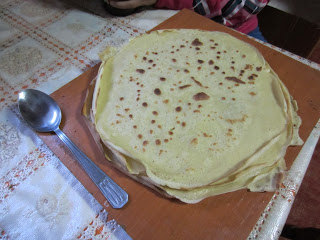Fishing with the family:
Early in the evening, we drive down a gravel road and into a pasture. Andreea, a cousin of the family, turns to me in the backseat and says, in English, "Food for cows." I love this clause, the simple and direct connection to the earth. Her husband is driving, and her brother is next to me in the backseat. We park in the middle of the pasture, and climb onto the base of a transmission tower to set up our poles. For the first time since my childhood, I hook my own worm, and it feels good.
Uninterested in fishing, Andreea wants to make sure I'm comfortable and entertained. I assure her that I'm not bored. I love fishing. It's like writing, in a sense; sitting and waiting in the realm of potential for an idea or a feeling. And as I'm thinking this, I see a herd of cows on their way home for the night, some pausing to drink from the river. Andreea attempts a cast and catches the tower. We laugh. Frogs are gurgling behind us. The wind stops, and the river now looks like a lake. The boys catch four tiny fish, which they'll bring home for the cat.
I move to make room for Andreea, and this time she casts with a magnificent force; she casts the entire contents of our fishing gear into the water. We're laughing hysterically. Her brother says, "Un calamitate!!" Now he's laughing as hard as us. Her husband hangs over the edge of the concrete and retrieves most of our supplies. "Un calamitate!" I'll never forget learning this word, feeling this moment--the familiarity and strangeness of language, how necessary, yet not always essential for understanding. Her husband, speaking no English, her brother, hardly any, and I, speaking Romanian barely beyond the level of a four-year-old. I'm laughing so hard I'm crying--and still we can't stop laughing. Un calamitate--my Romanian, their English, this beautiful, funny dusk. Andreea asks if I'll write a poem about this. She knows what the title would be.
Driving back to their house to be overfed wonderfully home-cooked food from the garden, Andreea asks me if I will return to visit them în viitor (in the future). As I assure her that I will, a woman passes us on foot; she's pushing a wheelbarrow carrying two children covered by a blanket. Her husband says something to her, and she translates: "In America, you see this?" Her brother looks at me and says again, "Go Fish--a beautiful game."
Driving back to their house to be overfed wonderfully home-cooked food from the garden, Andreea asks me if I will return to visit them în viitor (in the future). As I assure her that I will, a woman passes us on foot; she's pushing a wheelbarrow carrying two children covered by a blanket. Her husband says something to her, and she translates: "In America, you see this?" Her brother looks at me and says again, "Go Fish--a beautiful game."






































